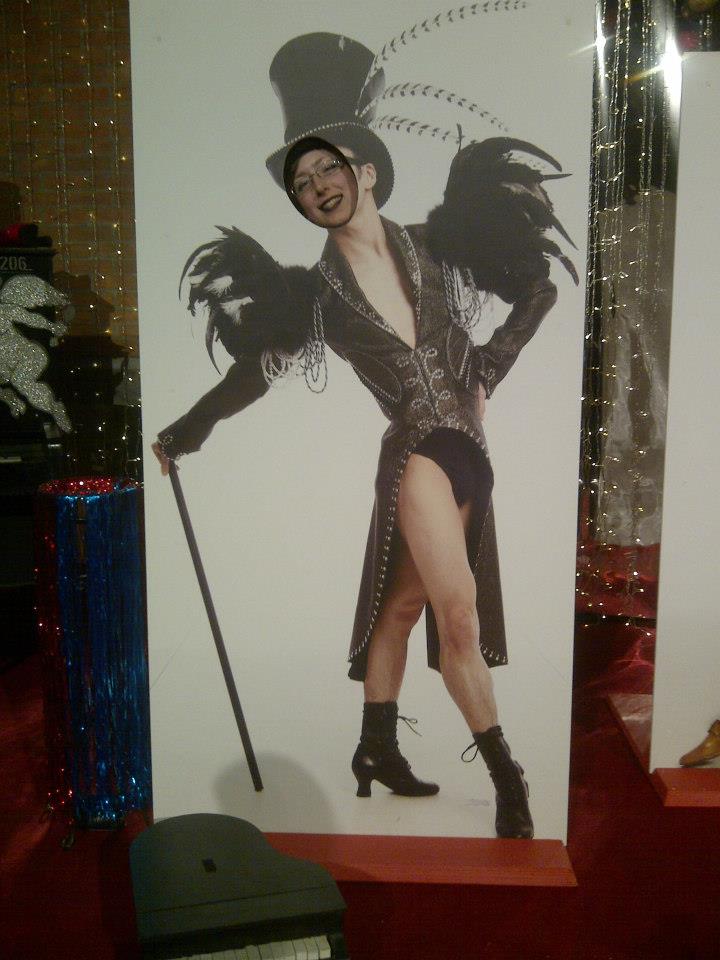I have been a fan of Elton John for quite some time, with Goodbye Yellow Brick Road being one of my all-time favourite albums. Naturally, I was very excited to hear that Rocketman would be coming to theatres. At first, I was expecting a simple biopic about this rock and roll legend, but after the film’s release I began to hear from more and more people that his life story was being presented as a musical. And even though I was prepared to watch a biopic musical, this film still gave me something completely unexpected.
Blast from the past – all dressed up for a ballet inspired by the music of Elton John. I’ve ALWAYS been a fan 😉
Although the core of the film was more of a biopic, the musical numbers had a completely different tone from the rest of the film. Each time Elton (Taron Egerton) sang one of his songs, the film would become a kind of fantasy where anything was possible and everything was over the top. Whereas the rest of the film took place in the “real world”, the fantasy musical numbers took place in Elton’s world. This shift in tone was jarring at times, yet effective. Elton John has always been known for his over-the-top performances, so it is only fitting that the musical numbers in this film reflect that.
I also really appreciated the wide variety of songs that were featured in the film. We saw song titles written on Bernie Taupin’s (Jamie Bell) lyrics, we heard snipets of some songs, and got full-blown musical numbers for others. It was really fantastic how many iconic songs could be fit into the film. But I was also really impressed by the recurrence of two songs in particular: “Rocketman” and “Goodbye Yellow Brick Road”. Both of these songs were used to punctuate the highs and lows of Elton’s early life and career, with the tune of “Rocketman” being used to signal a high, and the tune of “Goodbye Yellowbrick Road” used to signal a low.
Yet, despite the over-the-top nature of the musical performances, there is a stripped down sort of quality to the story telling. Elton John quite literally strips down as he is telling his life story in rehab. As he enters rehab in the beginning of the film, he is in full costume and puts up as many barriers between himself and the other people in the room. However, as the story progresses, Elton begins to strip away more and more of his costume as he bares more and more of his soul to these complete strangers. He enters rehab as a fiery, sparkling devil, and strips down all of the layers of his stage persona to reveal the person he is underneath. Finally, he is “reborn” as he exists rehab dressed in an angelic white suit.
One thing to take into consideration when watching this film is that the executive producer is also the subject of the biopic. Although Elton John has undoubtedly given audiences a glimpse into his early career, there is obviously a personal bias that influences the story of the film, and the addition of more fantastical elements can lead to parts of the story becoming skewed. That being said, this bias is addressed when Elton is in rehab and tells the other patients that he came from a loving family. We see from the following scenes (and the rest of the film, for that matter) that this was not the case. The tag line for the film even boasts that the story is based on “a true fantasy”. In this film, we only know what Elton John has chosen to share with us from his unique and fantastical point of view. And although what we have seen on screen may be true, in the telling of someone’s life story within the time frame of a movie, certain elements will be edited, left out, or glossed over.
Due to this kind of editing of his life story, moments like Elton John’s brief relationships with women felt rushed and a little out of place. However, if you look at the film as one man’s quest to find love and to be loved for who he is, the speed and which he rushes through these relationships indicates to what extent these attempts to find love failed. And because of this, the film naturally ends when Elton John becomes capable of loving himself. Once he leaves rehab, the following moments of his life are quickly reviewed through pictures and text, rather than through film, to suggest that after being able to love himself, Elton John was able to get his happy ending where he is loved by others.
Most importantly, the acting had to be well executed for this film to work. When acting in a biopic, particularly when the subject of the film is still alive, there can be an enormous expectation from the audience (and, I would imagine, the cast and crew of the film) for the lead actor to perfectly portray their character. Taron Egerton not only looked like Elton John, but his acting and his signing were good enough to create the illusion that this was a young Elton John on screen.
I am starting to get the feeling that there is a new trend growing in movies. Between Rocketman, Bohemian Rhapsody, and the upcoming films Yesterday and Blinded By The Light there seems to be a gradual increase in films that feature classic rock music. Could we see more biopics and rock music-inspired dramas coming to theatres? And who will be the next group/musician to have their music featured on the big screen?





